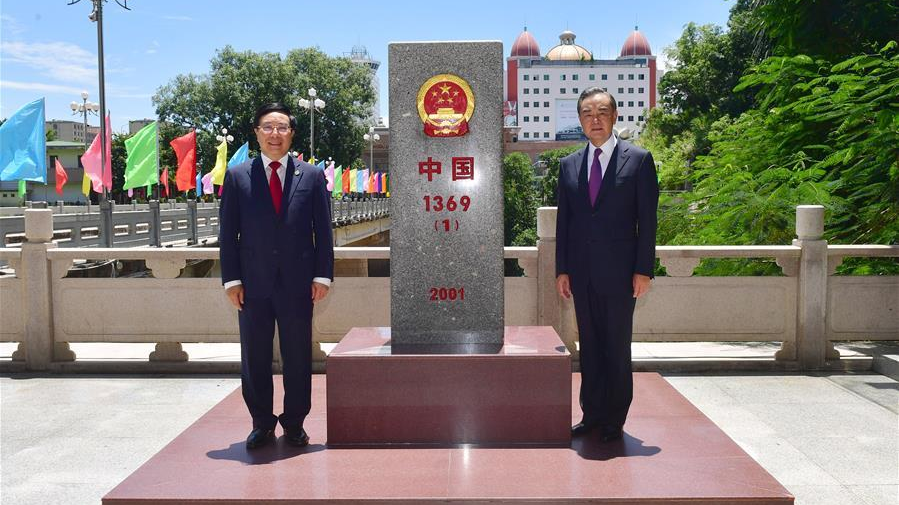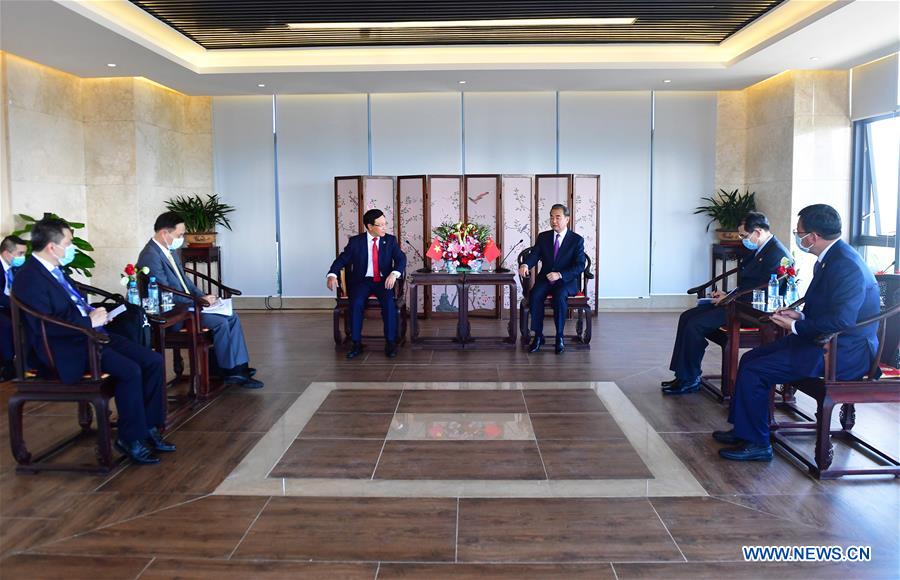
Chinese State Councilor and Foreign Minister Wang Yi (R) and Vietnamese Deputy Prime Minister and Foreign Minister Pham Binh Minh attend an event commemorating the 20th anniversary of the demarcation of the land boundary and the 10th anniversary of the erection of boundary markers in Dongxing, south China's Guangxi Zhuang Autonomous Region, August 23, 2020. /Xinhua
Chinese State Councilor and Foreign Minister Wang Yi (R) and Vietnamese Deputy Prime Minister and Foreign Minister Pham Binh Minh attend an event commemorating the 20th anniversary of the demarcation of the land boundary and the 10th anniversary of the erection of boundary markers in Dongxing, south China's Guangxi Zhuang Autonomous Region, August 23, 2020. /Xinhua
Editor's note: Wang Li is a professor at Jilin University. The article reflects the author's opinions, and not necessarily the views of CGTN.
On August 23, Chinese Foreign Minister Wang Yi and his Vietnamese counterpart Pham Binh Minh attended events commemorating the 20th anniversary of the demarcation of the land boundary and the 10th anniversary of the erection of boundary markers in south China's Guangxi Zhuang Autonomous Region. Under the present circumstances, which have been deteriorated by the U.S.'s aggressive behavior in the South China Sea, this event is perceived to be significant for China and Vietnam as well as ASEAN.
As Wang Yi called on China and Vietnam to draw on the success of solving land boundary issues to seek an early settlement of maritime disputes, it is clear to see that the comprehensive strategic cooperative partnership between the two sides might reach new heights in the new era.
It is understandable that some people are concerned that Vietnam might follow the U.S.-sponsored India-Pacific Strategy, which aims to contain the rise of China in light of a Cold War mentality.
Some Western scholars have overestimated that the so-called bitter memories held by Vietnam will lead to confrontation with China. Over the past years, the United States has tried to woo Vietnamese leaders to join the Washington-initiated challenge to the legitimate claims of China in the South China Sea, as well as the U.S. accusation that China has held back a large amount of water in its reservoirs, leading to a severe drought in the region. However, geography and shared interests, including ideological affinity, affect foreign policy-making in all countries, as well as in Hanoi.
First, geographically, China and Vietnam are linked by shared mountains and rivers. Chinese Premier Li Keqiang promised to give Mekong countries priority access to COVID-19 vaccines once one is developed and put into use. His remarks came at the third Lancang-Mekong Cooperation (LMC) leaders' meeting via video link. Premier Li called the six Lancang-Mekong countries, which includes Vietnam, a de facto community with a shared future linked by the same water.
Since the cooperation on water resources aims to enrich the LMC's spirit of friendship, mutual benefit and win-win cooperation, China would share annual hydrological information with its partners starting from this year, aiming to better utilize water resources while addressing climate change and the natural disasters involved. Thus, China and Vietnam could further align the Belt and Road Initiative with other regional development strategies.

Chinese State Councilor and Foreign Minister Wang Yi holds talks with Vietnamese Deputy Prime Minister and Foreign Minister Pham Binh Minh in Dongxing, south China's Guangxi Zhuang Autonomous Region, August 23, 2020. /Xinhua
Chinese State Councilor and Foreign Minister Wang Yi holds talks with Vietnamese Deputy Prime Minister and Foreign Minister Pham Binh Minh in Dongxing, south China's Guangxi Zhuang Autonomous Region, August 23, 2020. /Xinhua
Second, ideologically, China and Vietnam are both Communist-led countries due to the historical choice made by each of their peoples. The two sides share a long-term friendship and cooperation in fighting against imperialism and hegemony in the 20th century, and now face a new task – building up a socialist system in accordance with the tenets of sovereignty, equality and non-intervention.
The Vietnamese Communist Party has stated that Vietnam attaches great importance to good-neighborly relations with China, featuring "long-term stability, future orientation, good-neighborly friendship and all-round cooperation." It is evident that the United States, which is adamantly opposed to Communist China, would never be lenient to a Communist-led Vietnam. Due to this, China and Vietnam need to work on national security, systematic security and economic security. Only in this way could both countries exchange their experiences and lessons in terms of enhancing Party governance and political reforms.
Third, economically, as the two most vibrant economies in Asia, China and Vietnam could complement each other in the fields of technology and investment. Since China is the largest economy in Asia, it is able to provide Vietnam with its advanced technologies and know-how in terms of infrastructure, AI and communications. In light of this, Wang Yi expects the two sides to make the common boundary better serve their development and people's well-being, shore up border governance system and capacity, and promote regional cooperation.
Long-term disagreements exist between the two sides on the South China Sea issue. However, China has indicated that the South China Sea is the common asset of the countries involved. Politically and legally, it is acceptable that all sides need to work together through peaceful measures to satisfactorily resolve maritime disputes. That means the legitimate rights and interests of the region's countries should be fully respected. However, while China continues to pursue development and progress to meet the desired goal, it will be resolved to opposing anyone who attempts to derail this direction — common security, regional stability and development for all concerned.
(If you want to contribute and have specific expertise, please contact us at opinions@cgtn.com.)